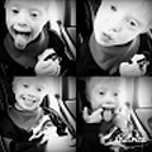Autism Walks into a Bar

Kerry Fender
Down’s Syndrome, my family and me – one mum’s account of family life with an extra chromosome.

A person with autism, a person with ADHD, and a person with OCD walk into a bar …
and no one notices.
That’s it. There’s no punchline. This isn’t a joke.
Most people think they are aware of autism, they think they know what it looks like.
But they don’t.
Not really.
Because it is so easy for some families to slip under the radar.
On the surface, the mum, dad, two teenage kids and granny that have just walked into the restaurant look almost exactly like all the other diners.
Some of the other diners might characterise the dad as a miserable old git if they happen to notice that, directly after he speaks to the waitress, the volume of the music reduces noticeably.
If they see that, despite having asked for the music to be turned down, he and his wife have allowed the kids to keep their earbuds in, they will probably just tut and feel superior because they’d never allow their kids use devices at the table – that’s just plain bad manners!
What the other diners are not aware of is just how unbearably loud that room is, even without the pounding music – the hum of a dozen or more conversations, the clatter of dishes and the clink of cutlery, the banging of the kitchen door, the hiss of beer pumps or coffee machines, the scraping of chairs.
What they probably wouldn’t understand is how letting the kids have sounds of their choice fed directly from their devices into their ears dulls the overwhelming cacophony of background noise just enough to prevent a fight-or-flight response or public panic attack.
What they would also not be aware of is how having her favourite music piped directly into her skull drives out the repeated, obsessive thoughts of death and disaster that are frequent, unwelcome intruders inside the younger child’s head; the only other way to get rid of them is at the point of a blade, cutting so deeply into her skin that the sharp sting of the pain drowns out all else.
But the other diners can’t see the scars, they are covered by her clothes, nor can they see either set of earbuds as they are covered by the kids’ longish hair.
So, no one is aware.
If any of the other diners notice that the granny is sitting at the table with a face like thunder, loudly nit-picking the menu, they will probably just dismiss her as a cantankerous old bat.
What they can’t possibly be aware of is the quivering needle on her anxiety gauge climbing towards the red zone because she doesn’t know if any of her ‘safe’ foods will be on the menu. She doesn’t have this vocabulary, though – she was a ‘picky eater’ a ‘fussy’ child, an ‘awkward’ child, a child so unwittingly frustrating to others that her mother used to lock her in the understairs cupboard, and her teacher made her work out in the corridor as she couldn’t bear to have her in the classroom.
The few foods granny will eat are simply the things she ‘likes’, the ones that don’t make her ‘feel ill’. So many of the things other people eat are so utterly revolting that even to think about having to eat them makes her feel panicky and sick. To be honest, she’d rather take a pill, like a spaceman, if she could, than feel and taste food in her mouth three times a day.
She’s just here for the company of her family.
But none of the other diners are aware of this, because old people don’t have autism: it wasn’t a thing back in their day, was it? I mean, it’s a modern epidemic, isn’t it, caused by, I dunno, maybe vaccines or pollution, or bad parenting, right?
And if any of the other diners do happen to hear the dad sniffing, they will probably assume he has a cold or hay fever, because it’s unlikely they will be aware of the intrusive smell of plastic wafting up off the tablecloth that will stop him from enjoying his food and has him wondering how his wife can possibly be telling the truth when she says she can’t smell it.
They will most likely assume that the mum is a poor spouse and mother, or unhappy with her marriage and family if they notice that she has stopped responding to the conversation at her table.
They will not be aware that her mind is completely feral and she’s never been able to stop it wandering at will, as it has done since she was a little child, sitting on her swing in all weathers, needing the repetitive back-and-forth motion to calm the storm of feelings and energies inside; back when her parents called her ‘Dolly Daydream’ and ‘highly strung’ but at school was renowned as a volatile nightmare who ‘could do better’ and must learn to control herself if she wanted to get anywhere in life.
No, none of the other diners are aware that autism* walks among them in that restaurant,
or at their workplace,
or in the house next door,
because sometimes autism hides in plain sight.
*and other neurodivergence.


